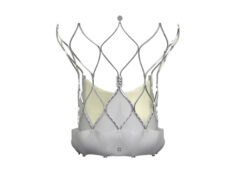
Initial experience with the Siegel (Mirus) 8Fr transcatheter aortic valve implantation (TAVI) device have been shared at New York Valves (5–7 June, New York, USA).
Pradeep Yadav (Piedmont Heart Institute, Atlanta, USA) presented the initial data for the device, which features a Rhenium alloy frame, a material more commonly used in spinal implants and unique for transcatheter heart valves.
Five sequential patients with severe, symptomatic aortic stenosis (were treated at the Instituto Nacional Del Torax in Santiago, Chile. Three patients had bicuspid aortic valves and two were tri-leaflet.
Three patients had peripheral arterial disease with vascular access <5.5 mm. There was no mortality or stroke at 30 days and no patients required a permanent pacemaker (PPM) or suffered vascular complications. At 30 days, the mean echo gradient was 6.7mmHg; four of the five patients had no peri-valvular leak (PVL) and one bicuspid patient had trace PVL.
The Siegel valve includes several unique features, including its 8Fr delivery sheath; nickel free construction; lack of foreshortening and intrinsic commissural alignment; dry porcine pericardial leaflets with anti-calcification treatment and with the valve pre-mounted on the balloon.
The combination of low delivery system profile and excellent haemodynamics is made feasible by the unique properties of the Rhenium alloys pioneered by MiRus including high yield strength, fatigue resistance and minimal recoil, the company said in a press release.
“This initial data is striking and potentially heralds a new age for TAVI,” stated Vinod Thourani (Piedmont Heart Institute, Atlanta, USA). “The ability to treat such complex patients with an 8Fr system and without nickel exposure should make TAVI safer and more broadly accessible. From a surgical viewpoint, the very low pressure gradients and low PVL [paravalvular leak] are critically important to implanters and our patients.”










